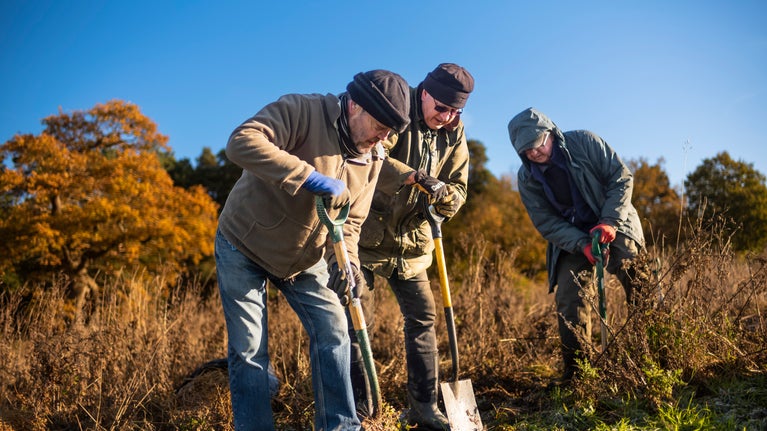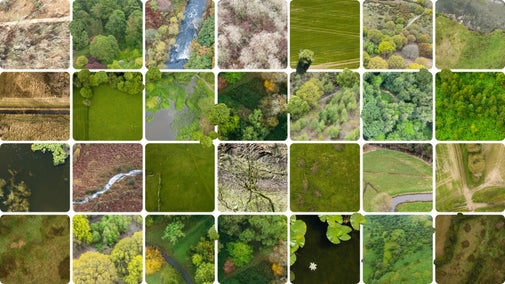
Caring for nature
Learn about our work on nature, climate and sustainability, and find out what you can do to make a difference.

The climate crisis can be overwhelming, but the small actions we take as individuals can help achieve big changes and show governments and businesses what kinds of measures are needed. Whether you're a nature lover, gardener, campaigner or a concerned grandparent, there are lots of ways to make a difference. Here are a few ideas to get you started.
According to The Climate Coalition, there’s a lot you can do to reduce your carbon emissions by making changes inside and outside of the home.
By 2030 the National Trust will be carbon net zero across its own emissions and those created by its supply chain, tenanted land and buildings, and investments. Net zero is when we achieve a balance between the carbon released into the atmosphere and the carbon removed from it.
Calculate your carbon emissions
A carbon calculator such as the WWF’s Footprint Calculator will help work out your existing carbon emissions. You can then decide what changes to make to reduce them. These may include walking and cycling more, swapping some meat and dairy in your diet for vegetables, eating more seasonal/locally produced food and saving energy in the home.
The world's water resources are under pressure so we all need to do our bit to use it wisely. According to Water UK, the average person uses 140 litres of water a day. Water takes energy to filter, heat and pump into our homes.
If you have a garden to collect rainwater (for watering plants), use mulch and bark to reduce moisture evaporating from flower borders and veg patches and avoid using sprinklers to water the lawn. Alternatively, turning the tap off when you brush your teeth could save as much as six litres of water a minute and buying more second-hand clothes helps to protect the resources needed to create new ones. For more tips on how to save water in your bathroom, kitchen and garden visit Waterwise.

Peatlands hold twice as much carbon as the world’s forests and offer precious habitats for wildlife and plant species, while also preserving archaeological sites. But peat extraction for compost and other uses is destroying peatlands and contributing to carbon emissions. The Westminster Government has introduced a ban on the use of peat in compost in England from 2024 but we're urging all gardeners to stop using peat before it comes into place.
Our gardening experts share their advice on peat-free gardening and creating your own compost.
The biodiversity crisis and the climate crisis are inextricably linked. We can't tackle one without the other. This is why we’re creating and restoring wildlife habitats and carrying out surveys to see how species of insects, birds and marine and land animals are faring. This data helps us make the changes needed to ensure nature can thrive.
You can support our conservation work by going on a nature trail or by taking part in a survey at your local National Trust place. Alternatively, you could join an annual wildlife count such as the RSPB's Big Garden Birdwatch survey or the Big Butterfly Count. Find out more about volunteering.
All living things rely on water, yet our rivers and seas and the wildlife that depend on them are suffering the effects of climate change and plastic pollution.
You can start by reducing the plastic you buy and avoiding single-use plastic where possible. Making careful choices in the supermarket and going to shops that offer refills (from milk to detergent) are good ways to cut plastic waste.
Many plastic items can be reused in the home, shared with others or donated to charities. Your local recycling services will take some of the items you need to dispose of including plastic bottles and containers.
Beeswax wraps and bamboo travel cups are just some of the eco-friendly alternatives that can stop plastic getting into the waterways.
Reusable cups and free water at National Trust places
If you bring a reusable cup to a National Trust place, we'll give you 25p off your hot drink.
We offer free drinking water at all the places in our care, reducing waste from disposable water bottles. We are also on the Refill app, which connects people to places where they can eat, drink and shop with less waste.
Help with the clean up
You could also volunteer for a litter pick or a beach clean at the places in our care. Or there are lots of other events taking place throughout the year with organisations and charities such as Surfers Against Sewage, Keep Britain Tidy, the Canal and River Trust, Greenpeace and the Marine Conservation Society.

There are lots of things you can do to help wildlife to thrive in your neighbourhood. If you have a garden, wy not let the grass grow during the spring to attract bees and other pollinators? You could also make a home for wildlife and make fatballs to help birds during the winter. Here are more tips on how to make your garden wildlife friendly.
We know that trees are one of our best natural defences against climate change and we need your help to plant and establish 20 million trees by 2030. At their peak, these new trees could store up to 300,000 tonnes of carbon a year. For as little as £5, you could plant a tree that will support life for years to come and create more woodlands for future generations to enjoy.
Do you know someone who could use a bit more of the great outdoors in their life? Studies have shown that regularly spending time in nature can significantly improve our health and wellbeing. We also know that if people fall in love with nature they'll be more likely to look after it. Talking to your friends and family about how climate change is affecting their favourite places is a good way of sharing knowledge and getting more people to take action.
So why not treat your loved one to a refreshing coastal walk, a wander through a fragrant garden, or a picnic under the shade of a tree? Every time you visit us you're helping to protect nature, beauty and history for future generations to enjoy.

Learn about our work on nature, climate and sustainability, and find out what you can do to make a difference.

Nature is depleting faster in the UK than almost anywhere else in the world. Donating to Adopt a Plot is a small way you can take a big step towards restoring nature across whole landscapes.

With support from the Government’s Green Recovery Challenge Fund, we're looking for ways to protect our environment and combat climate change. Find out more about the work we're doing.

From tips on saving water to combatting plastic pollution, learn more about our work to protect precious coasts and rivers for wildlife and people, and what you can do to help.

Climate change is the single biggest threat to the places we care for. Take a look at our environmental pledges as we adapt, reduce carbon emissions and address the damage already done.

We're urging everyone to help us stop the destruction of nature in the UK with the launch of Save Our Wild Isles, a joint campaign with charities RSPB and WWF. Discover a new documentary about the changes needed to save nature and find out what you can do to help.

From sunglasses made from wheat straw to pencils that grow into trees, we've got lots of sustainable gifts that don't cost the earth.